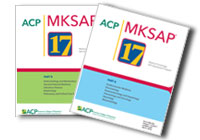
 MKSAP has been trusted by internists since 1967 as the
best resource for updating knowledge. MKSAP 17, available in
Complete, Digital, and Print packages, consists of 11 comprehensive
text chapters with related multiple-choice questions. You'll find
1,200 completely new questions to help you identify learning gaps,
stay current, and gain the knowledge you need to provide the best
possible patient care. MKSAP 17's original and high-quality
questions evolve out of case studies and patient scenarios based on
the latest evidence.
MKSAP has been trusted by internists since 1967 as the
best resource for updating knowledge. MKSAP 17, available in
Complete, Digital, and Print packages, consists of 11 comprehensive
text chapters with related multiple-choice questions. You'll find
1,200 completely new questions to help you identify learning gaps,
stay current, and gain the knowledge you need to provide the best
possible patient care. MKSAP 17's original and high-quality
questions evolve out of case studies and patient scenarios based on
the latest evidence.
For more information on MKSAP 17, or to order your copy, visit www.acponline.org/products_services/mksap/17/
MKSAP 17 Q & A
A 52-year-old woman is evaluated for fatigue and lower extremity swelling. One year ago, she had acute idiopathic pericarditis treated with anti-inflammatory medications and colchicine. Symptoms initially improved and her medications were discontinued. However, for the past 3 months, she has had worsening symptoms of exertional fatigue and edema in both legs. She currently takes no medications.
On physical examination, she is afebrile, blood pressure is 130/78 mm Hg, pulse rate is 88/min, and respiration rate is 16/min. Pulsus paradoxus of 15 mm Hg is present. The estimated central venous pressure is 10 cm H2O, and the jugular venous pulse contour shows diminished y descents. The lungs are clear to auscultation. Heart sounds are normal, with no rubs or gallops. Hepatomegaly is present, and peripheral edema is noted in both lower extremities up to the knees.
A 12-lead electrocardiogram is normal. Echocardiogram shows the cardiac chambers to be normal in size and function with a moderate circumferential pericardial effusion. A CT of the heart shows normal pericardial thickness.
A pericardiocentesis fails to resolve the elevated right atrial pressure documented on right heart catheterization.
Which of the following is the most likely diagnosis?
A. Cor pulmonale
B. Effusive constrictive pericarditis
C. Heart failure
D. Recurrent acute pericarditis
Click here for the answer and critique.

